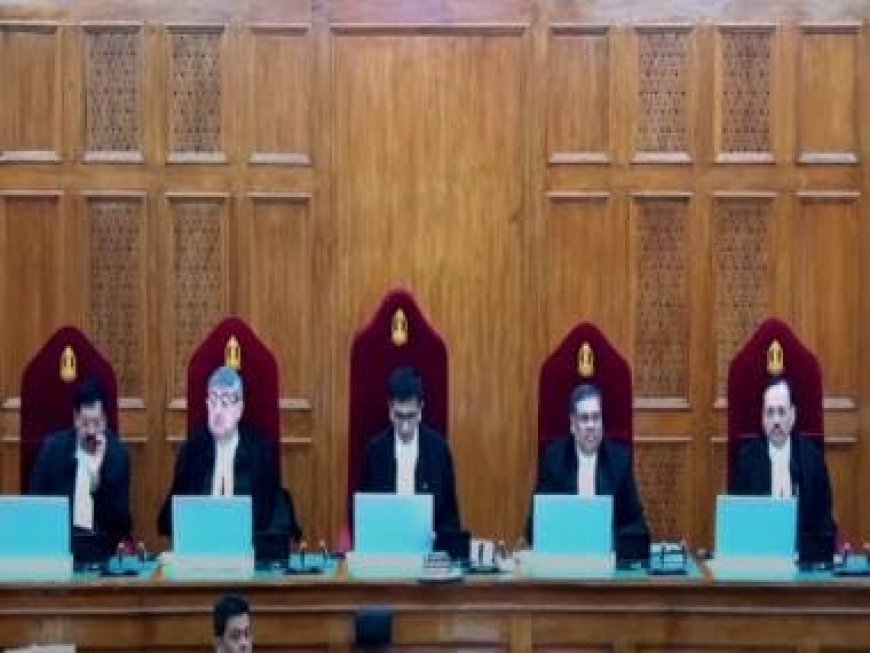SC upholds abrogation of Article 370 in J&K constitutionally valid, paves way for elections in 2024
SC upholds abrogation of Article 370 in J&K constitutionally valid, paves way for elections in 2024

The Supreme Court on Monday upheld the abrogation of Article 370 in Jammu and Kashmir constitutionally valid and asked the Election Commission of India to conduct elections to the Legislative Assembly of Jammu and Kashmir by 30 September 2024.
In three separate verdicts which were unanimous, the Supreme Court said that Article 370 was a temporary provision.
Supreme Court says it has held that Article 370 is a temporary provision. https://t.co/bW9fF268nM
— ANI (@ANI) December 11, 2023
CJI Chandrachud said there are three judgements in the matter and all are unanimous.
He said the Supreme Court cannot rule on the validity of government orders and the President’s move to quash Article 370 was not mala fide.
“…We hold the exercise of Presidential power to be valid,” said the top court.
Ruling that all provisions of the Constitution can be applied to Jammu and Kashmir to 370(1)(d), the SC said that Article 370 was meant for the constitutional integration of Jammu and Kashmir with the Union and it was not for disintegration, and the President can declare that Article 370 ceases to exist.
The Supreme Court also directed the government to hold elections in Jammu and Kashmir by 30 September 2024.
“We direct that steps shall be taken by the Election Commission of India to conduct elections to the Legislative Assembly of Jammu and Kashmir by 30 September 2024,” said CJI Chandrachud.
“We direct that steps shall be taken by the Election Commission of India to conduct elections to the Legislative Assembly of Jammu and Kashmir by 30 September 2024,” says CJI reading judgement in Article 370 matter. pic.twitter.com/Vt6dgWVFSD
— ANI (@ANI) December 11, 2023
The apex court reserved its verdict in the matter on 5 September after a 16-day hearing.
During the hearing, the top court heard Attorney General R Venkataramani, Solicitor General Tushar Mehta, senior advocates Harish Salve, Rakesh Dwivedi, V Giri and others on behalf of the Centre and the intervenors defending the abrogation of the provisions of Article 370.
Senior advocates, including Kapil Sibal, Gopal Subramanium, Rajeev Dhavan, Zaffar Shah and Dushyant Dave, had argued on behalf of the petitioners.
The lawyers had dwelt on various issues, including the constitutional validity of the Centre’s decision to abrogate the provisions of Article 370, the validity of the Jammu and Kashmir Reorganisation Act, which split the erstwhile state into two Union territories, challenges to the imposition of the governor’s rule in Jammu and Kashmir on June 20, 2018 and the imposition of the president’s rule on December 19, 2018 and its extension on July 3, 2019.
The petitions challenging the abrogation of the provisions of Article 370 and the validity of the Jammu and Kashmir Reorganisation Act, 2019 that divided the erstwhile state into the Union territories of Jammu and Kashmir and Ladakh were referred to the Constitution bench in 2019.
The arguments in the matter had commenced on 2 August.
During the hearing, the apex court had asked who can recommend the revocation of Article 370 in Jammu and Kashmir when no constituent Assembly, the concurrence of which is required before taking such a step, exists there.
The top court had also asked how can a provision (Article 370), which was specifically mentioned as temporary in the Constitution, become permanent after the tenure of the Jammu and Kashmir constituent Assembly came to an end in 1957.
Some of the petitioners opposing the repeal of Article 370 had argued that the provision could not have been abrogated as the term of the Jammu and Kashmir constituent Assembly ended in 1957 after it drafted the erstwhile state’s Constitution.
With the constituent Assembly having become extinct, Article 370 acquired a permanent status, they had said.
The Centre had argued that there was no “constitutional fraud” in annulling the provision that accorded the special status to the erstwhile state of Jammu and Kashmir.
With inputs from agencies
What's Your Reaction?


























































